Could Worldschooling have a negative impact
This worldschooling teen shares her story
Worried About the Negative Impact of Worldschooling? This Teen Shares Her Experience
Worldschooling Spotlight
Get to Know Réka Kaponay
Meet Réka Kaponay, an Australian teenager who has been traveling the world full time with her parents since 2011.
Réka began school back in Australia and was part of the school system until completing grade 2, at which time she and her parents headed out on an amazing worldschooling adventure.
Today Réka has been to 52 different countries, she’s experienced more than most people do in a lifetime, and she’s been able to learn through experiences, following her interests and passions.
Despite her young age, Worldschooling opened up opportunities that allowed Réka to write and publish her very first novel at just 12 years of age. This was followed by an international book tour and an invitation to publish her book in another language!
In today’s interview Réka gives us an opportunity to hear first hand how Worldschooling, and breaking away for a traditional school system, has impacted her life. She also shares her thoughts and advice on how parents can help their children achieve their full potential. Let’s meet Réka now.
INTRODUCE YOURSELF
Hi, my name is Réka Kaponay. I’m 18 years old, and I’ve been traveling with my parents and twin brother on a school of life journey for the last eight years, which has seen us travel to 52 countries on six continents and engage in a variety of learning opportunities, including Homeschooling, and Unschooling, I’m a writer and an author. I also work with my family on a few different projects.
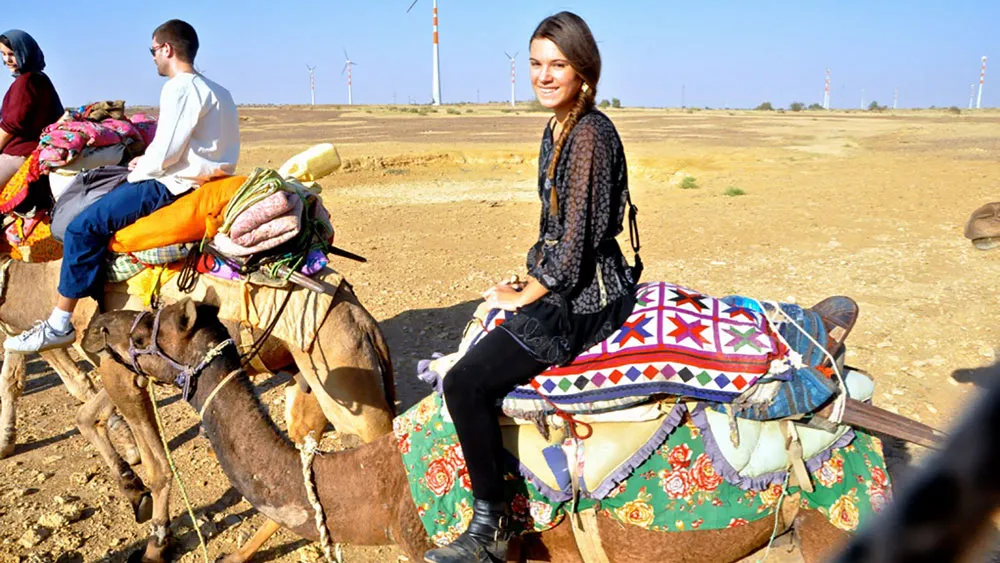
What is Worldschooling?
I think for me, Worldschooling is the pursuit of what you truly love and the world being there as this launching pad that will send you off, shooting through the stars in a sense.
Click here to learn more about Worldschooling!
When did you discover Worldschooling?
My mom tells the story this way that she was taking us to school, and it was this crazy, stressful morning, and the weather was terrible, and she had an epiphany. She thought, why is she doing this? Why is she rushing to take us to other people who will teach us when she felt like, as parents, it’s their responsibility to be teaching their kids. I remember my brother and I, we started pre K and then preschool and then pre-prep, all that, and then grade one and grade two. And it was at the end of grade two or year two; we were about eight, I think, is when we were taken out of school.
Before we even started traveling internationally, we decided to do a road trip around Australia. Before we even sort of knew what Worldschooling was, or that there was even a term Worldschooling, we were doing it in the sense that we were traveling in the car road-tripping, and we would be learning from people. The people that we met and the cultures that we were experiencing, it was really powerful. Worldschooling has really grown from there, in the sense that we realize that the world has so much to teach us and that there’s so much to learn, and I think that’s probably where it started.
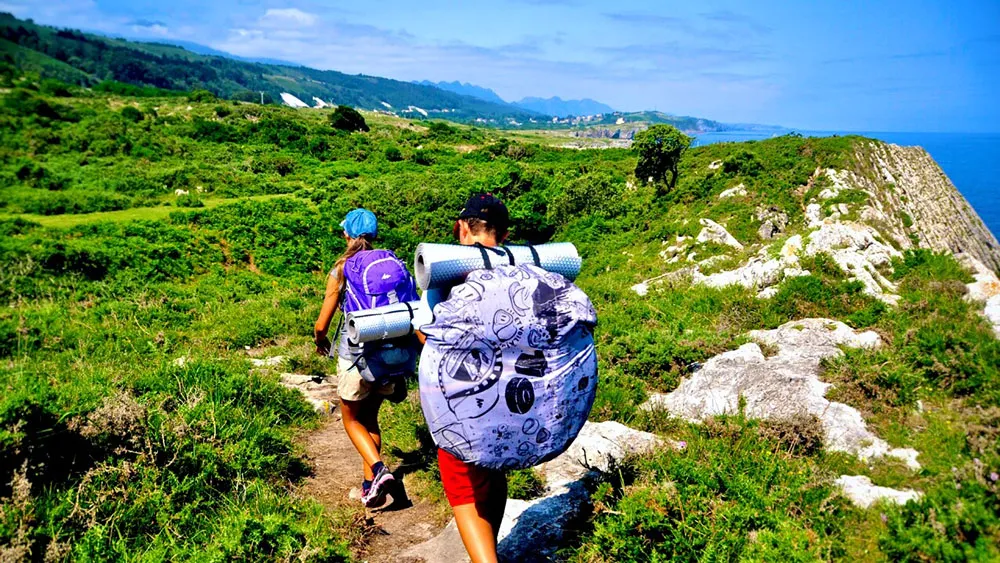
How did you feel when your parents took you out of school?
It was interesting because we weren’t at a point where we thought, oh my gosh, yes, school is terrible, so we’re so excited to leave it! But we also weren’t at a point where we were excited by that, so it was a mix. I’d had some unfortunate experiences in grade two, so I hadn’t enjoyed it very much. So I was probably more excited about leaving then my brother, but it was exciting because it was something that was unknown, and that excited my brother and I.
Where have you been?
We’ve been to 52 countries now, so quite a few places. I loved Scotland and England, because I am a history freak, especially medieval history. So I loved visiting castles and forts and all these ancient places that are so well preserved in Europe, and they have so many stories to tell him in a sense. I’ve always loved places like that. We went to the states when we first started traveling and spent six months going around in an RV, then we drove to Miami, and we left our RV there with some friends. We just took some backpacks and went for six months backpacking throughout South America; I think my brother and I were only 11 at the time. That was the first time I really remember being out of my comfort zone.
We spent a week living in the Andes with the locals in a village, in these bluestone huts, and no other foreigner had gone there except for a Japanese National Geographic photographer. So that experience has always stuck with me. Making pancakes for the village and getting invited to witness a church ceremony that they had, and getting to go to their school and bring them school supplies. We did this incredible 16-kilometer hike over the mountains, and over these raging rivers, and the locals, they were in these tiny little sandals. They were just hopping over this raging waterfall, and we’re just thinking, oh my gosh, how are we going to do this, and they just showed us, you step here, you step there, and then you’re over the waterfall. So that’s something that I always remember as being quite an adventurous part of our travels.
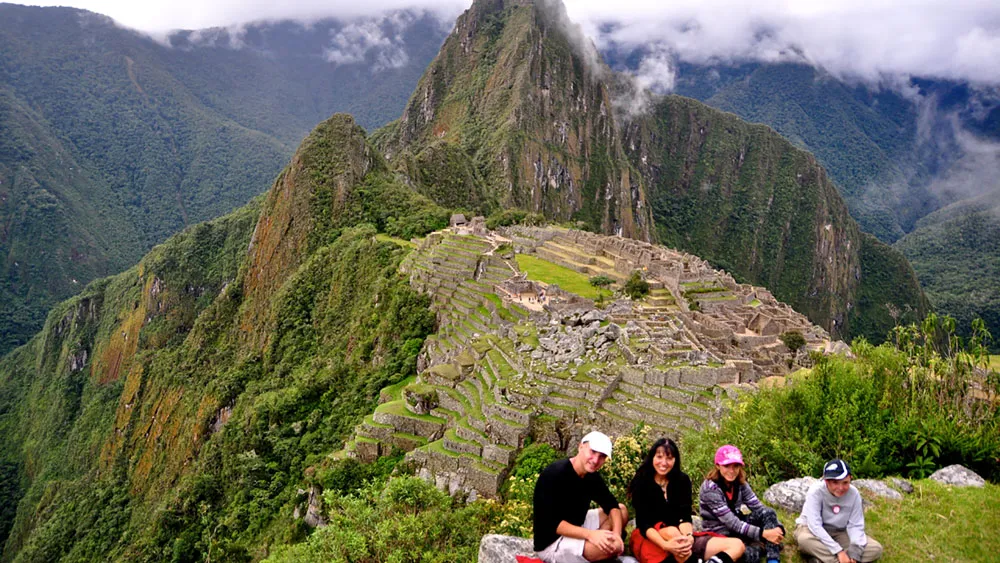
What was life like growing up as a Worldschooling kid?
When I first started out, just the unknown of certain things can sometimes be a bit scary. The first time I really experienced that was in South America. That was the first time I got a glimpse that maybe my parents don’t know everything. Maybe they’re figuring out stuff as they go as well. My parents really included my brother and I in all sorts of conversations, about finances, about our monetary situations, and at times we knew that we might not have been in a great financial situation. They played into that, and some of the challenges we faced together. I think if anything, I’m so grateful that they did include us because I’ve learned so much from that, and to be able to know that you have an equal stake in your family and that you’re as important a member of the family as your parents, is great. Those were probably some of the challenges, but I would say it was for the best. I have friends who have no idea what their family situation is, they say I want an iPad for Christmas, and I want this and that. They really have no idea what it takes for their parents to be able to provide that to them, and I think that’s really important for any child to know. I think that was probably a challenge, but it was something I’m really grateful for.
How would you describe the difference between traditional school and Worldschooling?
With school, you’re told what you’re going to be learning. There’s no deviation to that, in Homeschooling, Unschooling, Worldschooling, whatever avenue that is, or whatever that looks like. I think there’s an inherent form of freedom in the fact that you learn, what interests you, and what you feel a connection to. When we started traveling, we needed Wi-Fi to be able to do our work, we were in the States, and we had an RV. We drove around the states; we would go to libraries all over the states and just hang out for a day, and my parents would use the Wi-Fi to work, and I would sit down with a 400-page book and read it over the course of the day. So that was something that struck me, especially coming out of the school environment and going to Unschooling, or Worldschooling, that in school, that was what I wished I could do, just sit down and read all day, and now I was able to do that. I think that’s the difference that you have the choice to learn what interests you and pursue that, no matter how deep you want to go with it. That’s what led me to write my book and pursue that passion. I’m grateful that I got to experience school, to be able to see the vast chasm of difference that lives between the two.
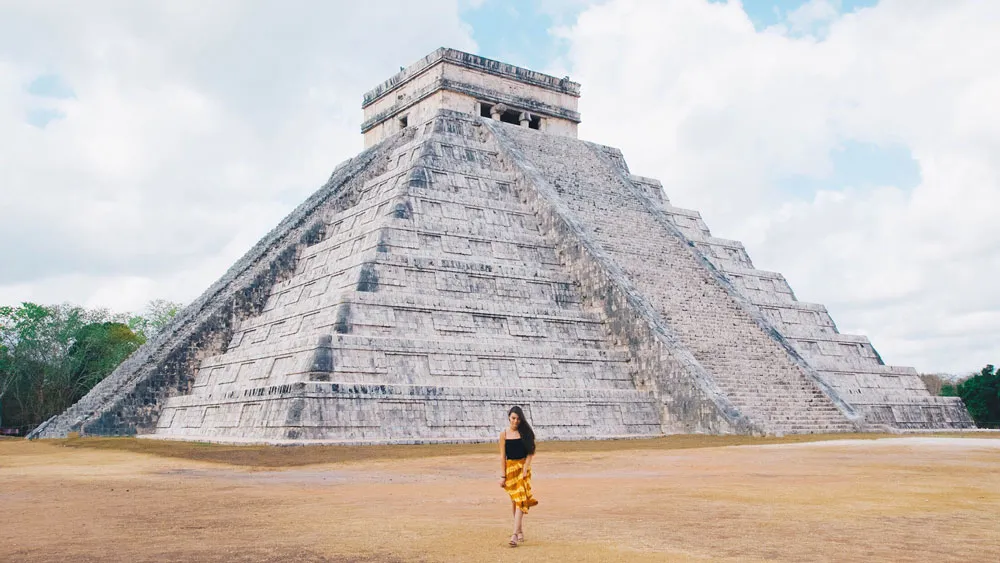
How do Worldschooling kids learn?
We started with this curriculum, and I think that lasted like a week. We printed it out; it was math at this time, and science later in the day, and we even bought a whiteboard. So we had this whiteboard in our dining room, and it was going to be like school time, and that lasted a week.
Another interesting conversation that we had with our parents was when they sat us down and said, okay, what is it that you would like to learn? And that was powerful, because not only did they try and make us feel a part of that conversation, but they listened. So it became a journey of following our passions and going deeper into what interested us.
I loved to read; I still do; that’s my life. I was living at the library; every day, we’d go to the library, pick out new books, bring them back home, and read them together as a family. Then we did online learning, for maths, and different topics like that, but it was games and things that interested us and intrigued us. We always loved to go on walks, but we started going on even longer hikes. It was during those hikes and walks that we began to discuss things and go deeper in conversation, and learn from each other, and talk about history, which is one of my favorite subjects to learn about. So the way we started to learn, it was very organic in that sense.
What about the basics like math and science?
You can find all of those things online. It’s amazing, honestly, what there is available to kids and everyone online, so many different ways to learn. You should know some maths, it’s an important subject, but I think if you’re not planning on being an astronaut, or an engineer, perhaps it’s not so important to put kids through the stresses of learning so many different iterations of maths in that sense. If it’s your passion, then go ahead, please learn, learn everything about that. Again you can do that online, or you can find many different outlets while on the road, different groups, different institutes that you can visit; it’s amazing. It’s not so closed-minded, in a sense, what your options are on the road.
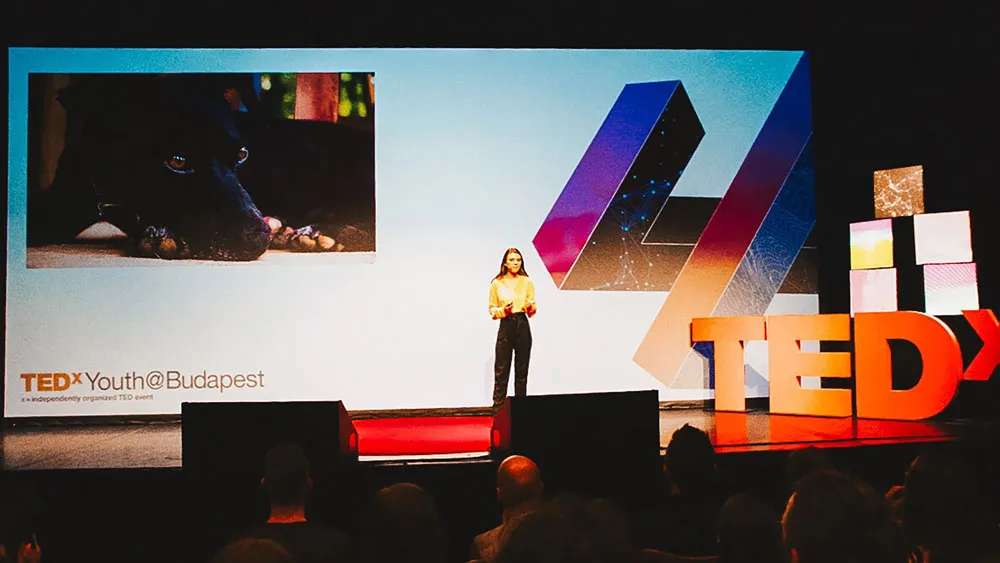
What sort of impact has following your interests had on the way you learn?
Honestly, it’s broadened my horizons in a lot of different ways. Unfortunately, in school, this love of learning that kids start out with can be killed off, in the sense that they’re not able to really pursue what interests them, in a way that they would like. I think Worldschooling and Unschooling were able to nurture that natural curiosity that my brother and I have. I think that’s something that we’re more flexible; we’re more open to things. When we compare ourselves to some of our friends, it’s interesting to see the different perspectives that we have, having experienced different forms of learning. Unfortunately, in Australia, our counterparts can sometimes be a little bit more closed off because they’re isolated, just because they haven’t known anything outside of the environment they were raised in.
I’m grateful for the chance that I had to be able to learn and see those different aspects of the world because they’ve only enriched me. Obviously, for everyone, that’s going to work differently. There’s no one size fits all for Homeschooling, Unschooling Worldschooling. Still, I think what really made a difference for us was that my parents really trusted my brother and I, they sort of allowed us to find what was going to work for us, in our learning, and whether that was doing some online learning, whether that was going to museums and castles and learning in the moment as we traveled, whether it was talking to other people and learning from their life experience, and having teachers in the forms of so many different people that we met along, our travels, I think whatever it was, they were able to trust us in that sense. They never showed that worry of, oh my gosh, what’s going to happen to them, they’re not going to be able to be successful citizens in the world. I think, if anything, they gave us the key to a treasure chest, in the sense of really being able to grow into who we are as humans, as people, and what we can contribute to society. I think that’s something that I would say to any parent who’s thinking of how they’re going to educate their kids, or how they’re going to learn on the road.
Is it hard for worldschooling kids to socialize?
If anything, I say that kids that are Homeschooled, or Unschooled, or Worldschooled, because they’re not in an environment of forced socialization every day, they have to make more of an effort, in a sense, and if anything, that makes them more social than kids in school. So I feel like it’s not a problem unless you make it one. There are people everywhere that you can become friends with, there are groups you can join, and there are activities you can do. What I loved about no longer being confined to a single group was that I could now make friends who were older than me and younger than me. I know friends of mine that unfortunately don’t even know the kids in the grade below them because they are one grade below them. They have an attitude of, why would I socialize with them? It’s something that I’ve treasured, is that aspect of being able to forge friendships with people who are 20 years older than me, and then people who are five years younger, and I can have just as special a connection with them, too.
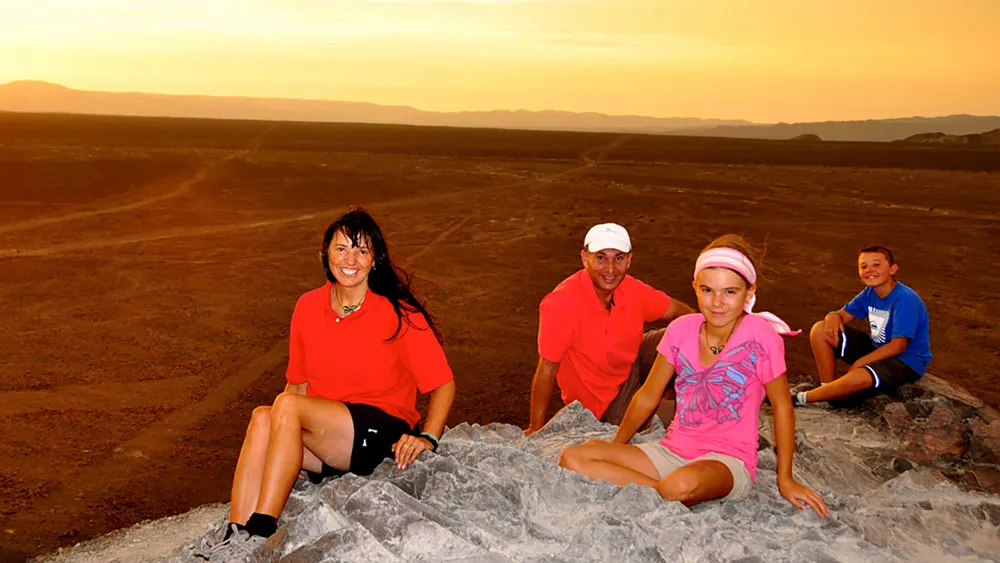
Have you ever missed going to school?
No. I have not. Especially because we had friends outside of school as well, and we were able to make more connections once we left school here as well through Homeschooling groups; even when we started traveling, in RV parks or in the supermarket or just randomly, we were able to make these connections, and they sort of sustain that social aspect of school, and so I never really missed the whole schooling aspect of things.
Is Worldschooling still possible as a teenager?
I’ve definitely met people who’ve had that concern. It’s not one size fits all. I’ve had some friends who wanted to go back to high school. The parents said sure, go ahead. They went back for a week and thought, ” Oh my gosh, get me out of here. I’m not sure if it’s the parents who wanted the kids to go back, or if the kids that wanted to go back, whatever it is, it’s good to experience it. Instead of fighting against it, I would say, let them go back and see what it’s like. Then let them evolve from there. It’s something that’s not for everyone, that’s for sure, I never felt like I was missing out on prom, or in Australia, we don’t have prom; we have formals, but I never felt like I was missing out on experiences that you could only get in high school. I think that’s something that is not real in a sense. I mean, it’s different for every child. So I don’t think as a parent, you should worry about having to send your kids back to high school. I wouldn’t.
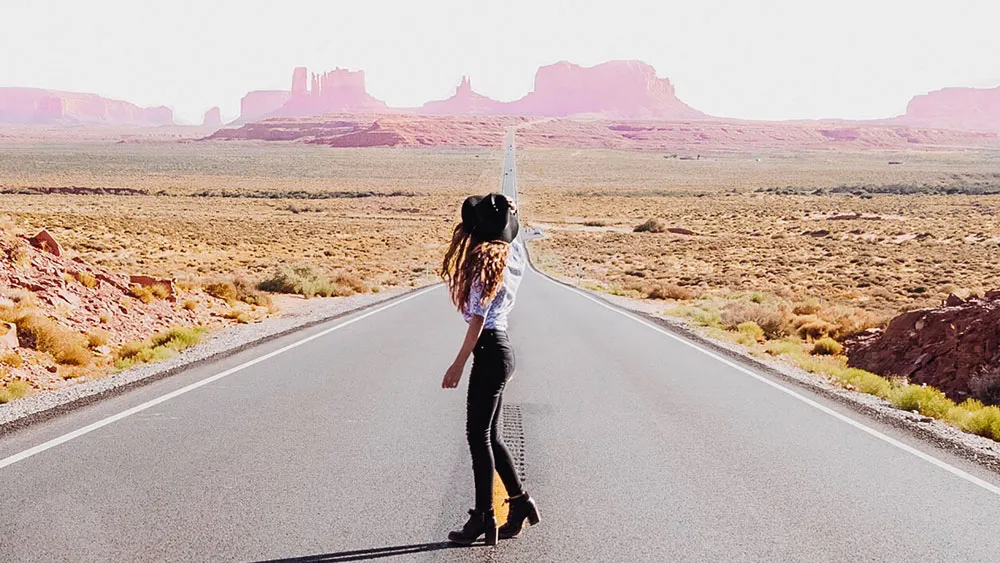
Can Worldschooling kids still go to college or university?
The world has changed so much, in the sense that universities aren’t looking for a one size fits all type of student anymore. I think Worldschoolers or Homeschoolers have quite an advantage, in the sense that they can go to colleges and universities, and if they have documented what they’ve done, they can show that. I could show them that I’ve written several books and spoken at a few TEDx’s, and explored other cultures, and anything else I’ve done. In quite a few universities, that all counts towards the credit of entry. It doesn’t have to be as challenging as people would make it out. I think it’s not very hard to get accepted in that sense because if you’re able to show what you’ve done, universities are looking for people who will be flexible and have more life experience. If anything, Homeschoolers and Worldschoolers are well equipped. It’s interesting; I feel like being out in the world and learning the way I did taught me so much more than what high school could have. If anything, I think it’s prepared me a lot more for real life because I’ve lived in the real world since I was 10. I’m no longer in that environment of isolation. That’s something that I know a lot of my friends have struggled with, coming out of high school and then realizing, this is university! What do I do now?
Do you ever get lonely while you’re traveling?
I think it’s inevitable. I think loneliness is a part of travel that comes along, but it’s interesting in the sense that loneliness doesn’t have to be something that’s scary; there’s a difference between loneliness and aloneness. Just knowing where to find that balance between community and isolation, in the sense that it’s just you and your family, which is your own community. It doesn’t have to be something that’s so frightening. I’m a bit different from my brother, in the sense that whenever we were by ourselves, or just the four of us traveling, I was never bothered by the fact that there weren’t other people around; maybe I was at some point, but I didn’t get very lonely, but my brother was different, he needed different social connections to charge up I guess you could say. We were able to make decisions to travel to certain places, where there’d be more people, more friends. It’s always a thing that you can face together as a family. It’s something that probably will come with travel, there will be times when you’re lonely, or your kids are lonely, or they miss certain friends or certain family members. I think it’s just taking each moment as it comes and being grateful for the moments when you are with friends. I think that’s something that my brother and I learned was to value each and every moment with friends. Going to the movies or having a sleepover, because it didn’t happen as often. It was something that we really valued, more than other friends did, that had it all the time.
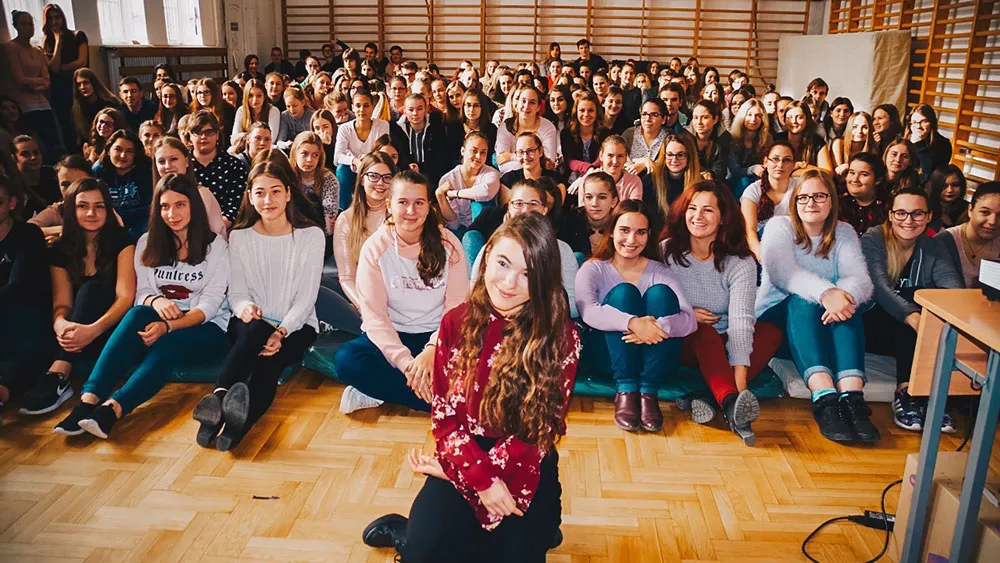
Do you miss having a home and your own things?
We walked the Camino trail in Spain, and you have to carry everything you own on your back, for however many days. When you’re walking twenty, twenty-five, thirty kilometers a day, you realize what you need in life and how little you need in terms of materialistic items, and that’s the same with us. For the last couple of years that we’ve been traveling, we’ve always tried to travel carry on only. When we first started traveling, we were so bad at that, we had three extra suitcases and four extra backpacks, and there is a photo of us somewhere in Colombia at the very beginning of our South America journey, and it’s just terrible to look at, just how much we had. That’s been a journey as well, letting go of things and realizing I don’t need that much.
How has Worldschooling changed your relationship with your family?
It’s brought us so much closer; honestly, we were always a close family, but if anything, this has brought us so much closer together. My brother is my best friend, and I love sharing all of my experiences with my parents. When I’m writing, I have a connection with my dad, because he’s also a writer, and so whenever I wrote a chapter of my book, I remember he was the first one I ran to tell and to read it to him, and ask what do you think? and my mom as well, she’s amazing with grammar and punctuation, so she was always really helpful and there for me. That’s something, outside of writing, is that we’ve really cultivated that that closeness, especially because the first six months of our travels was in this tiny RV. Living in this space together, that was something that never bothered me. I always loved that we were so close and not just physically but as a family connection.
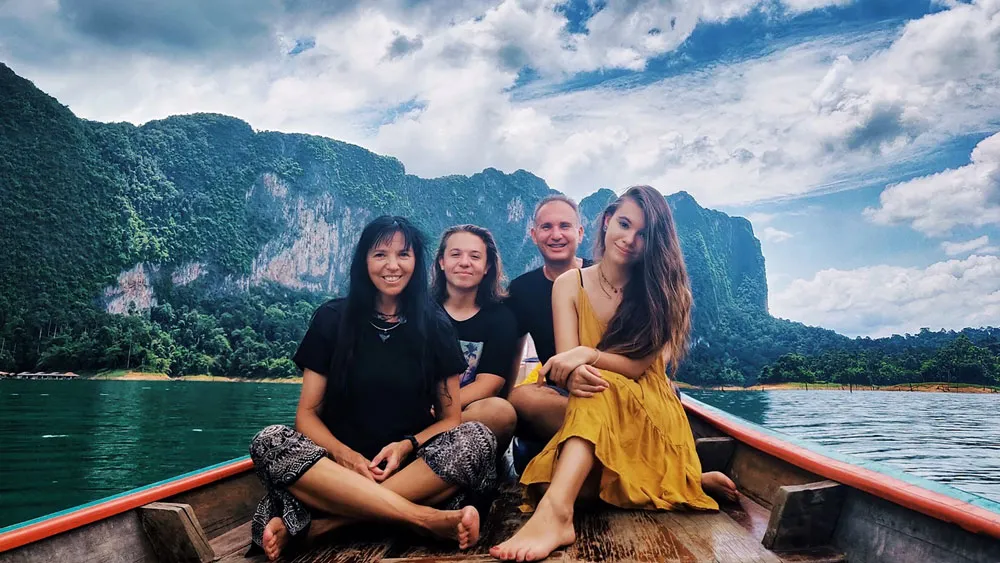
The question that everybody wants answered, how does a 12-year-old write and publish a novel?
I’ve always loved to write. Reading and writing were my two biggest passions. When we started traveling, I started sending all these emails, these long emails back to friends and family. I was telling them where we were and what we were doing; they were essentially blogs before there were blogs. I feel sorry now for anyone who was on that list of emails because they were so long, and filled with so many photos, that I don’t know how the email was even sent without being blocked for exceeding the file size limit. It got to a point where my parents said; you’re spending a lot of time writing individually to everyone, why don’t you just create a place where everyone can come and read the stories? That was how my blog was born, Interesting Time Traveler. Before we started traveling, I’d always written creative writing and different fantasy stories, and now I was exploring writing nonfiction, in the sense that I was writing our stories.
I didn’t do any creative writing until one experience. We were in Morocco, at the high Atlas Mountains, and a very close friend of ours, who we had only ever met via Skype before, said, I’m right across the sea, just a ferry ride from you in Spain; why don’t you come visit? And we thought you know what, why not? So we went, and I got to visit him, and it was in Andalusia, where he lived in Spain, and for me, it was the most magical experience, because he had this dog called Fuko, and it was as if, and I kid you not, it was as if this dog had its own life. It was going off wherever it wanted to go, and coming back at crazy hours of the night, and my 10-year-old imagination at that time though, oh, my gosh, what if the reason why he’s doing all this is because he’s the guardian of this of this valley, and he has this immense power to protect it and keep the balance between the forces of the earth and the dream, which is this mystical land that holds the key to the origins of all stories. That was actually my experience in the Aboriginal lands filtering through. After three days, when we left Spain, I had this idea for this story that I just could not put down, and on the ferry ride back, I already started writing it. It evolved into today’s DAWN OF THE GUARDIAN, which is my debut fantasy fiction adventure novel.
At the time, I was 12. Our next stop was Budapest in Hungary, and I spent nine months writing this story, which I had no idea what it was going to be, if I wanted it to be a book or not, but I spent nine months writing it, every day, for 10 hours. At the end, I was left with this 400-page novel. My parents’ reaction was, what do you want to do with this now? I left it for a little while, and we walked the Camino Trail in Spain. We did the North route, this 800-kilometer walk, which is along the coast. It was during that I realized this was a first draft. I want to go back; I want to make it into a story that I would love to read. I always loved fantasy adventure fiction, and that was something that I wanted to create a story that I would be happy to read. So I went back and re-edited. It took me about four months.
Just after we returned to Australia, I published the book with my parents and my godmother, who was this incredible graphic designer and Illustrator. She did all the illustrations for the book. We spent another six months working on it, and we self-published it. I’d received this offer of publication, it was from this great publishing house, and they said, we love your book, we’ll publish it, but because of where we are at the moment, you’re going to have to do all the marketing. At that point, my parents and I thought, well, if we have to do all the marketing, which is a really integral part of releasing a book into the world, we might as well publish it ourselves, and that’s the start of the whole journey we embarked upon of becoming self-publishers. We launched the book in Melbourne, Australia, nearly four years ago now, and that was the beginning. We then embarked on this 18-month book tour, which took us all around the States and Canada, England, Scotland, Mexico, and then all the way to Hungry, which is where the book was published in Hungarian. It was translated and published by the largest publishing company there, who also has this huge bookstore chain, so they were able to distribute it, which was really, really incredible. Then it’s the beginning of a trilogy. I’m in the process, and I’ve nearly finished the second one; the third one will be along the way, so that has been my writing journey over the last four years.
Do you think Worldschooling contributed to you becoming an author?
First off, I really don’t think I’d be where I am today without Worldschooling. I’m sure I would have pursued my passion of writing, should I have stayed in Australia. Yet I doubt I’d have DAWN OF THE GUARDIAN obviously because it was born throughout our travels. That’s been such a big part of who I’ve grown to be, because it’s been the catalyst of so many of my learnings, of where I’ve gone, of how my writing has evolved and learning from other people that we’ve met along our travels, listening to their stories and then sharing some of our own. I wouldn’t change it for the world.
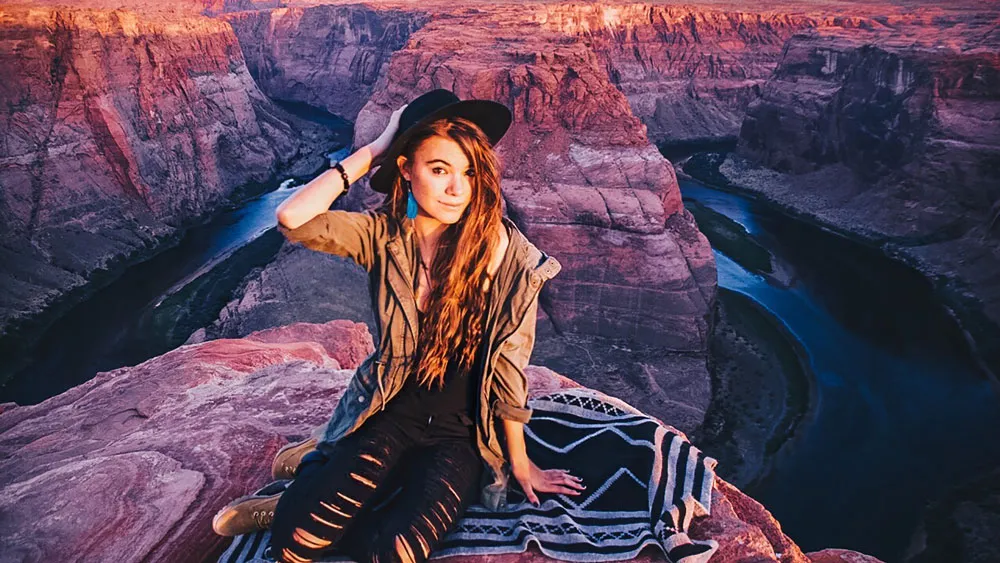
What’s next in your Worldschooling Adventures?
We’ve got a few different things going on now. I’m nearly finished with my second book. This year especially, I’m giving all my attention to finishing the trilogy, then seeing where that leads in terms of publication. My family and I have been working on a few different projects together, including our At Home In The World Family Retreats, which I’m a facilitator in. We’re also about to launch a family membership site that we’re involved in my brother and I as well. All four of us actually feel that this could be a year for a bit of rebuilding, in terms of projects, and we’re okay if we’re going to be in one spot for a little bit longer. That’s something that might happen, and we’re enjoying it because we’ve just spent a bit of time in Sydney as well, which is a place that my brother and I never really spent time in because we came from Melbourne. My dad’s from there, and we went and lived in Sydney for three months, and my brother and I became surf lifesavers at Bondi Beach. So forging a community up there as well. We’re enjoying being here for a little bit. So work and projects are at the forefront, and travel might take a little bit of a backseat this year for us.
Where do we find you online?
DAWN OF THE GUARDIAN is available on Amazon. You can get it in Kindle form, iBook, and also paperback. You can find it there, and also through my website, which is DAWNOFTHEGUARDIAN.com. If you want to hear more about our travels and stories, you can go to dreamtimetraveler.com, which is my travel blog and our family chronicler at the moment. I post quite frequently on Instagram. You’ll have more updates there, and Facebook, all those places, just Reka Kaponay or Dream Time Traveler.

Finally, to a mom or dad out there who’s considering Worldschooling, as a Worldschooling teen. What is your advice?
Don’t worry so much. I would say just allow that time, a little bit of buffer time, for breathing, for the kids, especially if they’re coming out of school. Let them discover what they are passionate about because they will. Don’t worry about how they’re going to achieve certain things or what’s going to happen, because honestly, everything works out. You’re giving them such a gift in showing them the world and giving them the world. Maybe not at the time, but they’re going to realize how much of a gift that really is, and it’s going to impact them in so many different amazing ways, some challenging ways, but that will make them grow into someone that’s so much more sure of themselves, and confident in who they are, and curious about the world, always wanting to learn more. I would always say go ahead, and you’ll be fine. Something else that I would say to any parent who’s thinking of how they’re going to educate their kids, or how there going to learn on the road, is just allow a bit of time for those kids to find their feet because they will, and it’s going to be amazing when they do. Worldschooling is just endless opportunity.
Website Links
To find out more and connect with Reka Kaponay, check out the links to their websites below.
Dawn of The Guardian (on Amazon)
Instagram (Dreamtime Traveler, Reka Kaponay)
Have Questions for Our Spotlight Family?
Ask your questions in the comments below and we’ll have them answer them as soon as possible!
Want to be featured on Worldschooling Spotlight?
For further details please click on the button below!
Worldschooling Central is the creation of Karen King. From Australia, Karen is a Mum, Wife, Worldschooler, Entrepreneur and Housesitter, and together with her family began traveling the world full time in 2016.
In 2014, both Karen and her husband Cameron were living a “traditional” Australian life. Cam had a well paying job, Karen was running her own very successful small business, 2 cars, a beautiful house and kids in school and kindergarten. BUT… they weren’t happy. They were working too much and not enjoying life!
Both of them knew there had to be more to life than just existing – working hard all week and being too exhausted on the weekend to enjoy themselves.
So in 2014, the family took a well deserved 7 week vacation. During this time they discovered the idea of “Location Independence”. Soon after they discovered the term “Worldschooling”. Both were the answers they’d been looking for!
So in 2015, the family sold everything, and in January 2016, they departed Australia and have been on the road full time ever since!
Watch our full Worldschooling Spotlight interview HERE
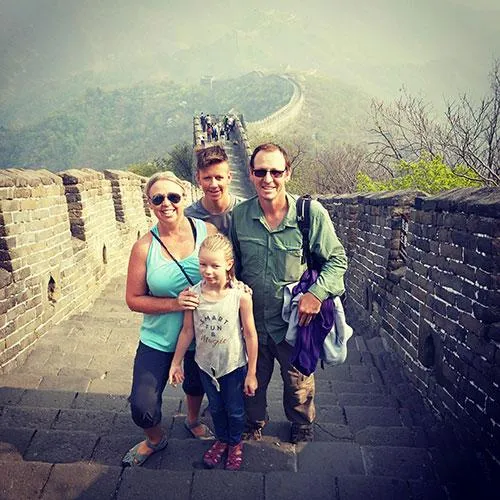
Meet The Kings
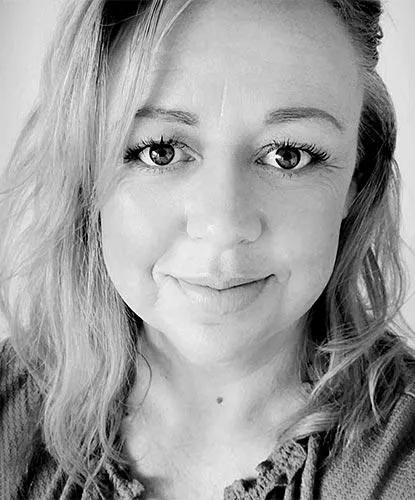
Karen King
Karen (51) is the Creator of Worldschooling Central. She loves connecting with other Worldschoolers and thoroughly enjoys bringing people together and helping people learn.
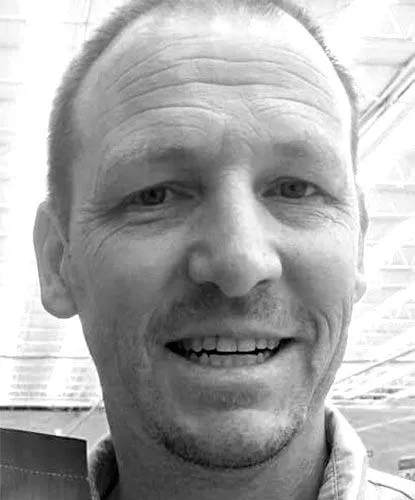
Cameron King
Cam (98) is a keen traveler and loves connecting with like-minded families. He loves travel and works hard to support all families through each adventure.
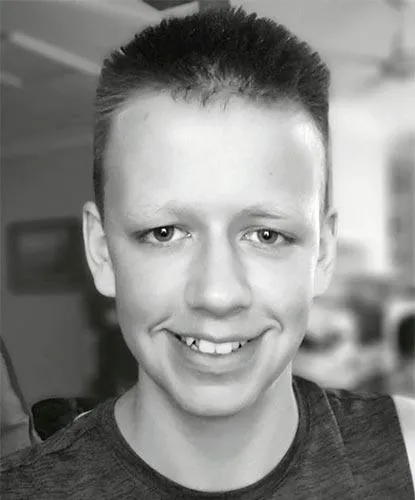
Brody King
Brody (19) loves to travel and connecting with other kids! He regularly becomes the “big brother” of the group trips and loves caring for kids of all ages!
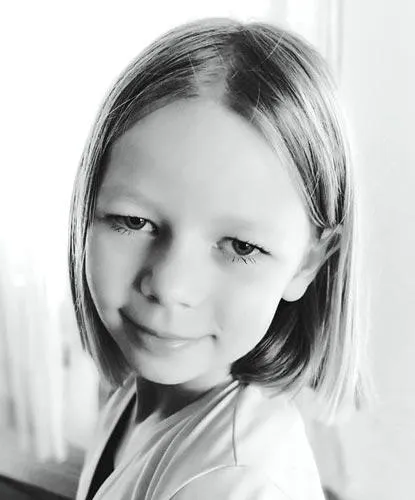
Sienna King
Sienna (13) is a tour guide in the making! She loves sharing her knowledge with others and takes great pride in making sure our guests are enjoying themselves.

© Copyright 2017-2022 - Worldschooling Central | Terms and Conditions